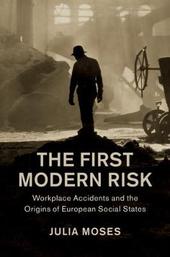
|
The First Modern Risk: Workplace Accidents and the Origins of European Social States
Hardback
Main Details
| Title |
The First Modern Risk: Workplace Accidents and the Origins of European Social States
|
| Authors and Contributors |
By (author) Julia Moses
|
| Series | Studies in Legal History |
|---|
| Physical Properties |
| Format:Hardback | | Pages:332 | | Dimensions(mm): Height 235,Width 158 |
|
| ISBN/Barcode |
9781108426503
|
| Classifications | Dewey:344.40465 |
|---|
| Audience | | Professional & Vocational | |
|---|
| Illustrations |
Worked examples or Exercises
|
|
Publishing Details |
| Publisher |
Cambridge University Press
|
| Imprint |
Cambridge University Press
|
| Publication Date |
21 June 2018 |
| Publication Country |
United Kingdom
|
Description
During the late nineteenth century, many countries across Europe adopted national legislation that required employers to compensate workers injured or killed in accidents at work. These laws suggested that the risk of accidents was inherent to work and not due to individual negligence. By focusing on Britain, Germany, and Italy during this time, Julia Moses demonstrates how these laws reflected a major transformation in thinking about the nature of individual responsibility and social risk. The First Modern Risk illuminates the implications of this conceptual revolution for the role of the state in managing problems of everyday life, transforming understandings about both the obligations and rights of individuals. Drawing on a wide array of disciplines including law, history, and politics, Moses offers a fascinating transnational view of a pivotal moment in the evolution of the welfare state.
Author Biography
Julia Moses is Senior Lecturer in Modern History at the University of Sheffield, co-founder and co-chair of the Risk, Policy and Law Research Group at Sheffield's Centre for Medical Humanities, and currently Marie Curie Fellow in Sociology at the Georg-August-Universitat Goettingen, Germany. Her previous publications include The Impact of Ideas on Legal Development (with Michael Lobban; 2012) and Marriage, Law and Modernity: Global Histories (2017).
Reviews'Based on detailed work in three countries and languages, this book looks broadly and comparatively at how governments dealt with workplace accidents in the nineteenth century, one of industrialization's earliest dilemmas. With both empirical substance and theoretical sophistication, it also illuminates the more general problem of the contemporary state first undertaking what is now its foremost task, managing modernity's ever-growing risks.' Peter Baldwin, University of California, Los Angeles 'In this masterful and path breaking study, Moses identifies the genealogical origins of European social states in the neglected sphere of workplace accidents and the social policies that governments adopted to address what they came to recognize as the 'first modern risk'. Weaving together a stunning array of research - from law and moral philosophy to state theory and citizenship studies - this book charts the shifting responsibility for the inevitable perils of industrial capitalism, from the personal agency of freedom of contract to state management of an increasingly social distribution of risk. This is a book as timely as it is profound. As neoliberalism's unremitting assaults on today's social states have given rise to brutalizing levels of inequality, nothing could be more urgent than our learning from Moses' deep analysis of the social and political conditions that once created and sustained national commitments to egalitarian social rights.' Margaret Somers, University of Michigan 'The emergence of the European social state, which exemplifies much of the European Union, has roots in workplace accidents and the risks not only to individuals but to the larger community. In an industrializing society, is an individual solely responsible for mitigating risks of the work place? Does the employer have a role? What is the role of the state? Using a wide range of British, German, and Italian primary and secondary sources, and specifically focused on developments of the second half of the 19th century through the 1920s, this well-documented monograph uses a comparative approach to trace the development of the concept of risk and its connection to the social state, one that now provides an insurance-based social safety net. The argument is sound and carefully argued. Summing up: recommended.' T. F. Armstrong, Choice
|